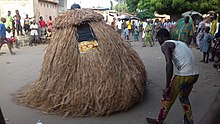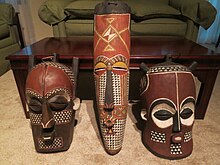Local African ceremony in Benin featuring a zangbeto.
The traditional African religions (or traditional beliefs and practices of African people) are a set of highly diverse beliefs that includes various ethnic religions. Generally, these traditions are oral rather than scriptural, include belief in an amount of higher and lower gods, sometimes including a supreme creator, belief in spirits, veneration of the dead, use of magic and traditional African medicine. Most religions can be described as animistic with various polytheistic and pantheistic aspects. The role of humanity is generally seen as one of harmonizing nature with the supernatural.
According to the author Lugira, "it is the only religion that can claim
to have originated in Africa. Other religions found in Africa have
their origins in other parts of the world."
Spread
Adherents of traditional religions in Sub-Saharan Africa are distributed among 43 countries and are estimated to number over 100 million.
Although the majority of Africans today are adherents of Christianity or Islam, African people often combine the practice of their traditional belief with the practice of Abrahamic religions.
The two Abrahamic religions are widespread across Africa, though mostly
concentrated in different areas. They have replaced indigenous African
religions, but are often adapted to African cultural contexts and belief
systems.
Followers of traditional African religions are also found around the world. In recent times, traditional religions, such as the Yoruba religion, are on the rise. The religion of the Yoruba is finding roots in the United States among African Americans and some others.
Basics
Animism builds the core concept of traditional African religions, this includes the worship of tutelary deities, nature worship, ancestor worship and the belief in an afterlife. While some religions adopted a pantheistic worldview, most follow a polytheistic system with various gods, spirits and other supernatural beings. Traditional African religions also have elements of fetishism, shamanism and veneration of relics.
Traditional African religions can be broken down into linguistic cultural groups, with common themes. Among Niger–Congo-speakers
is a belief in a creator God or higher deity, which is considered by
some to be a widespread and ancient feature of Niger-Congo-cultures,
along with other more specialized deities, ancestor spirits,
territorial spirits, evil caused by human ill will and neglecting
ancestor spirits, and priests of territorial spirits. New world religions such as Santería, Vodun, and Candomblé, would be derived from this world. Among Nilo-Saharan
speakers is the belief in Divinity; evil is caused by divine judgement
and retribution; prophets as middlemen between Divinity and man. Among Afro-Asiatic-speakers is henotheism,
the belief in one's own gods but accepting the existence of other gods;
evil here is caused by malevolent spirits. The Semitic Abrahamic religion of Judaism is comparable to the latter world view. San religion is non-theistic but a belief in a Spirit or Power of existence which can be tapped in a trance-dance; trance-healers.
Some researchers, including historical ethnolinguist Christopher Ehret,
suggest that monotheistic concepts, including the belief in a creator
god or force (along with the veneration of many lesser deities and
spirits) are ancient and indigenous among peoples of the Niger-Congo
ethnolinguistic family (of much of West Africa and Central Africa) and
date to the beginning of their history, in a form substantially
different from the monotheism found in Abrahamic religions. Traditional
Niger-Congo religion also included polytheistic and animistic elements.
Traditional African medicine
is also directly linked to traditional African religions. According to
Clemmont E. Vontress, the various religious traditions of Africa are
united by a basic Animism. According to him, the belief in spirits and
ancestors is the most important element of African religions. Gods were
either self-created or evolved from spirits or ancestors which got
worshiped by the people. He also notes that most modern African folk
religions were strongly influenced by non-African religions, mostly
Christianity and Islam and thus may differ from the ancient forms.
Ceremonies
West
and Central African religious practices generally manifest themselves
in communal ceremonies or divinatory rites in which members of the
community, overcome by force (or ashe, nyama,
etc.), are excited to the point of going into meditative trance in
response to rhythmic or driving drumming or singing. One religious
ceremony practiced in Gabon and Cameroon is the Okuyi, practiced by several Bantu
ethnic groups. In this state, depending upon the region, drumming or
instrumental rhythms played by respected musicians (each of which is
unique to a given deity or ancestor), participants embody a deity or
ancestor, energy or state of mind by performing distinct ritual
movements or dances which further enhance their elevated consciousness.
When this trance-like state is witnessed and understood,
adherents are privy to a way of contemplating the pure or symbolic
embodiment of a particular mindset or frame of reference. This builds
skills at separating the feelings elicited by this mindset from their
situational manifestations in daily life. Such separation and subsequent
contemplation of the nature and sources of pure energy or feelings
serves to help participants manage and accept them when they arise in
mundane contexts. This facilitates better control and transformation of
these energies into positive, culturally appropriate behavior, thought,
and speech. Also, this practice can also give rise to those in these
trances uttering words which, when interpreted by a culturally educated
initiate or diviner, can provide insight into appropriate directions
which the community (or individual) might take in accomplishing its
goal.
Spirits
Followers of traditional African religions pray to various spirits as well as to their ancestors.
This includes also nature, elementary and animal spirits. The
difference between powerful spirits and gods is often minimal. Most
African societies believe in several “high gods” and a large amount of
lower gods and spirits. There are also religions with a single Supreme
being (Chukwu, Nyame, Olodumare, Ngai, Roog, etc.). Some recognize a dual god and goddess such as Mawu-Lisa.
Traditional African religions generally believe in an afterlife, one or more Spirit worlds, and Ancestor worship
is an important basic concept in mostly all African religions. Some
African religions adopted different views through the influence of Islam
or even Hinduism.
Practices and rituals
Bakongo masks from the Kongo Central
There are more similarities than differences in all traditional African religions. The deities and spirits are honored through libation or sacrifice (of animals,
vegetables, cooked food, flowers, semi-precious stones and precious
metals). The will of the gods or spirits is sought by the believer also
through consultation of divinities or divination.
Traditional African religions embrace natural phenomena – ebb and tide,
waxing and waning moon, rain and drought – and the rhythmic pattern of
agriculture. According to Gottlieb and Mbiti:
The environment and nature are infused in every aspect of traditional African religions and culture. This is largely because cosmology and beliefs are intricately intertwined with the natural phenomena and environment. All aspects of weather, thunder, lightning, rain, day, moon, sun, stars, and so on may become amenable to control through the cosmology of African people. Natural phenomena are responsible for providing people with their daily needs.
For example, in the Serer religion, one of the most sacred stars in the cosmos is called Yoonir (the Star of Sirius). With a long farming tradition, the Serer high priests and priestesses (Saltigue) deliver yearly sermons at the Xooy Ceremony (divination ceremony) in Fatick before Yoonir's phase in order to predict winter months and enable farmers to start planting.
Traditional healers are common in most areas, and their practices include a religious element to varying degrees.
Divination
Early-20th-century Yoruba divination board
Since Africa is a large continent with many ethnic groups and
cultures, there is not one single technique of casting divination. The
practice of casting may be done with small objects, such as bones,
cowrie shells, stones, strips of leather, or flat pieces of wood.
Traditional healer of South Africa performing a divination by reading the bones
Some castings are done using sacred divination plates made of wood or performed on the ground (often within a circle).
In traditional African societies, many people seek out diviners
on a regular basis. There are generally no prohibitions against the
practice. Diviner (also known as priest) are also sought for their
wisdom as counselors in life and for their knowledge of herbal medicine.
Virtue and vice
Virtue
in traditional African religion is often connected with carrying out
obligations of the communal aspect of life. Examples include social
behaviors such as the respect for parents and elders, raising children
appropriately, providing hospitality, and being honest, trustworthy, and
courageous.
In some traditional African religions, morality is associated
with obedience or disobedience to God regarding the way a person or a
community lives. For the Kikuyu, according to their primary supreme creator, Ngai, acting through the lesser deities, is believed to speak to and be capable of guiding the virtuous person as one's conscience.
In many cases, Africans who have converted to other religions
have still kept up their traditional customs and practices, combining
them in a syncretic way.
Sacred places
Some sacred or holy locations for traditional religions include Nri-Igbo, the Point of Sangomar, Yaboyabo, Fatick, Ife, Oyo, Dahomey, Benin City, Ouidah, Nsukka, Kanem-Bornu, Igbo-Ukwu, and Tulwap Kipsigis, among others.
Traditions by region
This list is limited to a few well-known traditions.
Central Africa
- Bantu mythology (Central, Southeast, Southern Africa)
- Bushongo mythology (Congo)
- Kongo religion (Congo)
- Lugbara mythology (Congo)
- Baluba mythology (Congo)
- Mbuti mythology (Congo)
- Dinka religion (South Sudan)
- Hausa animism (Chad, Gabon)
- Lotuko mythology (South Sudan)
East Africa
- Bantu mythology (Central, Southeast, Southern Africa)
- Gikuyu people#Culture and beliefs (Kenya)
- Akamba mythology (Kenya)
- Maasai mythology (Kenya, Tanzania, Ouebian)
- Kalenjin mythology (Kenya, Uganda, Tanzania)
- Dini Ya Msambwa (Bungoma, Trans Nzoia, Kenya)
Horn of Africa
- Waaqeffanna (Ethiopia)
- Waaqism (Ethiopian-Somali Region)
- Arabian polytheism (Ethiopia, Eritrea)
Southern Africa
- Bantu mythology (Central, Southeast, Southern Africa)
- Lozi mythology (Zambia)
- Tumbuka mythology (Malawi)
- Xhosa mythology (Southern Africa)
- Zulu mythology (South Africa)
- San religion (South Africa)
- Traditional healers of South Africa
- Manjonjo Healers of Chitungwiza of Zimbabwe
West Africa
- Akan religion (Ghana, Ivory Coast)
- Dahomean religion (Benin, Togo)
- Efik mythology (Nigeria, Cameroon)
- Edo religion (Benin kingdom, Nigeria)
- Hausa animism (Benin, Burkina Faso, Cameroon, Côte d'Ivoire, Ghana, Niger, Nigeria, Togo)
- Odinani (Igbo people, Nigeria)
- Serer religion (A ƭat Roog) (Senegal, Gambia, Mauritania)
- Yoruba religion (Nigeria, Benin, Togo)
- West African Vodun (Ghana, Benin, Togo, Nigeria)
- Dogon religion (Mali)
North Africa
- Ancient Egyptian religion (Egypt, Sudan)
- Punic Religion (Tunisia, Algeria, Libya)
- Traditional Berber religion (Morocco (including Western Sahara), Algeria, Tunisia, Libya, Egypt, Mauritania, Mali, Niger, Chad, Burkina Faso)
- Hausa animism (Sudan)





